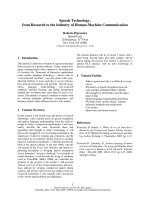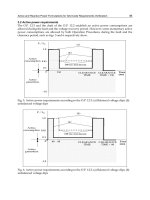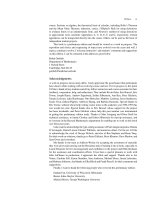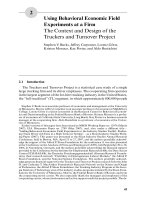From Nuremberg to The Hague - The Future of International Criminal Justice Part 5 ppsx
Bạn đang xem bản rút gọn của tài liệu. Xem và tải ngay bản đầy đủ của tài liệu tại đây (82.24 KB, 21 trang )
judgment were based on a theoretically simple – but
politically explosive – premise: no rule of international
law existed to prevent the arrest in London (whether
for the purposes of prosecution before the English
courts or for extradition to a third state) of an
American or Chilean national for acts occurring
outside the UK and involving no real connection with
the territory or nationals of the UK.
The Pinochet judgment was a landmark because it
emphasised the role of national courts – Spanish and
English – for the prosecution of the most serious inter-
national crimes. It relied on three principles:
1. that there are certain crimes that are so serious that
they are treated by the international community as
being international crimes over which any state
may, in principle, claim jurisdiction;
2. that national courts, rather than just international
courts, can – and in some cases must – exercise
jurisdiction over these international crimes, irre-
spective of any direct connection with the acts; and
3. that in respect of these crimes it can no longer be
assumed that immunities will be accorded to
former sovereigns or high officials.
The emergence of these principles is closely
connected to the proceedings at the Nuremberg and
After Pinochet: the role of national courts 69
70
Tokyo war crimes tribunals, addressed by Professors
Clapham and Overy in their lectures. In his lecture,
Professor Clapham addressed the contribution which
the Nuremberg proceedings have made to the subse-
quent development of international law.
3
He described
the way in which the substantive norms of interna-
tional law – both international human rights law and
international humanitarian law – have been influenced
by the emergent principles which the Nuremberg
judges developed and applied. He described the
complexities of the law; the prospects and challenges of
the emerging principles governing liability for
complicity in war crimes, crimes against humanity and
genocide; and he concluded by touching on the princi-
ple of ‘complementarity’, that is to say, the relationship
between national courts and international courts in
the exercise of jurisdiction over the most serious
crimes.
I address some of the issues which arise when we ask
the general question: which courts – national or interna-
tional – are best suited to exercise jurisdiction over indi-
viduals accused of crimes against humanity, war crimes
and genocide? In posing that question, I should state at
the outset that I proceed on the basis that criminal justice
3
See chapter 2 above.
After Pinochet: the role of national courts 71
dispensed through courts (national or international)
can be an appropriate way – although not the only way –
of dealing with the most serious international crimes.
That is not an assumption which is universally held, as a
growing literature on the subject indicates.Criminal law
in general – and international law in particular – will
never be a panacea for the ills of the world.And there are
other means for dealing with the gravest crimes: they can
be ignored; they can be the subject of national amnesties;
they can be addressed through processes which have
come to be known as ‘truth and reconciliation’; they can
be the subject of extra-judicial means providing for
summary justice; and they can be the subject of diplo-
matic deals.
But, for better or worse, and whatever theoretical or
policy justifications may be found (whether deterrence,
or punishment,or the ‘seeking of the truth’),the interna-
tional community has determined that the gravest
crimes are properly the subject of criminal justice
systems. If nothing else, that is one clear consequence of
the creation of the International Criminal Court:
4
in
establishing it, the international community has deter-
mined that criminal courts (as opposed to civil courts, or
administrative courts, or human rights courts) are to be
4
Statute of the International Criminal Court, Rome,17 July 1998,
in force 2 July 2002, (1999) 37 ILM 999.
72
a principal means for the enforcement of international
criminal law,and that national courts (within the state in
which the crimes are committed and in third states) and
international courts have a role to play.
In recent years, national courts have become more
prominent in these matters. They are faced with differ-
ent circumstances. In most situations, national courts
will deal with cases relating to facts which have
occurred within the geographical area in which they are
located. But it has become clear that national courts will
only rarely try their own nationals where war crimes are
concerned, and even more rarely where crimes against
humanity or genocide are concerned. In some cases,
national proceedings are concerned with acts occurring
outside the state seeking to exercise jurisdiction, when
the sole connection is the presence of the defendant
within the geographical jurisdiction of the state. That
was the Pinochet case,
5
and the case against Hissene
Habré in Senegal.
6
In other cases, indictments have
been issued when the defendant is not even present in
the jurisdiction: that is the case for the indictment by a
5
R. v. Bow Street Metropolitan Stipendiary Magistrate, ex parte
Pinochet Ugarte (No. 3) [2000] 1 AC 147.
6
Cour de Cassation (Senegal’s Court of Final Appeals), judgment
of 20 March 2001, which upheld the Court of Appeal’s decision
to dismiss the charges.
After Pinochet: the role of national courts 73
Belgian prosecutor of Prime Minister Sharon
7
and of a
foreign minister of Congo,
8
a case to which I shall
return, as well as the proceedings against President
Gaddafi in France.
9
And states have been creative in
finding other means: the Lockerbie proceedings in a
Scottish criminal court (and then an appeals court)
relocated to the Netherlands.
10
And internationalised
national courts are established or being established to
7
The Complaint Against Ariel Sharon, Cour d’Appel de Bruxelles,
Chambre des Mises en Accusation, Pen. 1632/01, judgment of
26 June 2002.
8
Democratic Republic of the Congo v. Belgium, Case Concerning
the Arrest Warrant of 11 April 2000, ICJ, General List No. 121,
judgment of 14 February 2002, www.icj-cij.org/icjwww/
idocket/iCOBE/icobejudgment/icobe_ijudgment_20020214.
pdf.
9
Arret, Cour de Cassation, 13 March 2001, No. 1414. See also
Arret, Cour d’Appel de Paris – Chambre d’accusation, 20 October
2000, www.sos-attentats.org. For a discussion of this case, see
Salvatore Zappala,‘Do Heads of State in Office Enjoy Immunity
from Jurisdiction for International Crimes? The Ghaddafi Case
Before the French Cour de Cassation’ (2001) 12 European
Journal of International Law 595–612.
10
Her Majesty’s Advocate v. Megrahi, No. 1475/99, High Court of
Justiciary at Camp Zeist (Kamp van Zeist), 31 January 2001,
www.scotcourts.gov.uk/index1.asp. See also Omer Y. Elagab,
‘The Hague as the Seat of the Lockerbie Trial: Some Constraints’
(2000) 34 International Lawyer 289–306; Sean D. Murphy,
‘Contemporary Practice of the United States Relating to
International Law:Verdict in the Trial of the Lockerbie Bombing
Suspects’ (2001) 95 American Journal of International Law
405–7.
74
deal with international crimes in Bosnia, in East Timor,
in Sierra Leone and in Cambodia.
11
Against this background I will explore the relationship
between national criminal courts and international
criminal courts. The international community has
determined that both should play a role in combating
impunity.
The International Criminal Court
It is appropriate to begin with the International
Criminal Court (ICC).The Statute emphasises ‘that the
ICC established under this Statute shall be complemen-
tary to national criminal jurisdictions’.
12
The Statute
thus gives effect to what is now referred to as the ‘prin-
ciple of complementarity’. This means that the ICC will
not be entitled to exercise jurisdiction if the case is
11
See e.g. the following articles for a discussion of these proposals:
Robert Cryer, ‘A “Special Court” for Sierra Leone?’ (2001) 50
International and Comparative Law Quarterly 435–46; and Boris
Kondoch, ‘The United Nations Administration of East Timor’
(2001) 6 Journal of Conflict and Security Law 245–65. For a
discussion of international courts in general, see Cesare P. R.
Romano, ‘The Proliferation of International Judicial Bodies:
The Pieces of the Puzzle’ (1999) 31 New York University Journal
of International Law and Politics 709.
12
Note 4 above, Preamble (emphasis added).
After Pinochet: the role of national courts 75
being investigated or prosecuted by a state which has
jurisdiction over it, or if the case has been investigated
by a state which has jurisdiction over it and the state has
decided not to prosecute for genuine reasons, or if the
person has already been tried for conduct which is the
subject of the complaint ‘by another court’.
13
The ‘prin-
ciple of complementarity’ means that, in the emerging
institutional architecture of international criminal
justice, the jurisdiction of the ICC will not be hierarchi-
cally superior to that of national courts. Indeed,the ICC
Statute gives primacy to national courts. This reflects a
desire to maintain a degree of respect for traditional
sovereignty. It means that it will be first and foremost
for these courts to act; the ICC will play a residual role,
serving as a long-stop in the event that justice is inade-
quately dispensed at the national level.
The policy here being applied is not an accidental
one, but rather the product of deliberation and negoti-
ations carried on over many years. The international
community is saying that it is primarily for national
courts to exercise jurisdiction. There are several ratio-
nales for that policy: (1) it recognises that national
courts will often be the best placed to deal with interna-
tional crimes, taking into account the availability of
13
Ibid., Articles 17(1)(a), (b) and (c) and 20(3).
76
evidence and witnesses, and cost factors; (2) it recog-
nises that the human and financial burdens of exercis-
ing criminal justice have to be spread around, they
cannot be centralised in The Hague; (3) it creates an
incentive for states, to encourage them to develop and
then apply their national criminal justice systems as a
way of avoiding the exercise of jurisdiction by the ICC;
and (4) in the expectation that that will happen, it
might allow more states to become parties to the ICC
Statute, reassured in the knowledge that they have it
within their own power to determine whether or not
the ICC will exercise jurisdiction.
In contrast to other signatory states, including the
United Kingdom, the United States is not reassured that
politically motivated or malicious prosecutions will not
be brought before the ICC.
14
Even though the ICC will
adjudicate only the most serious international crimes
where national courts are unable to act, and these
crimes are defined in accordance with the United States’
own Code of Military Justice,
15
the US has sought to
ensure that its peacekeepers would be permanently
14
On some of the US arguments, see Philippe Sands, ‘The Futur
e
of International Adjudication’ (1999) 14 Connecticut Journal of
International Law 1–13.
15
Uniform Code of Military Justice, 10 USC 801–941; also in
Manual for Courts-M
artial, United States, Appendix 2, at A2-1
to A2-35 (2000).
After Pinochet: the role of national courts 77
exempted from the ICC’s jurisdiction. This proposal
has been rejected by the United Nations Security
Council, in favour of a year-long immunity, which may
or may not be renewed.
It should be mentioned that the primacy accorded by
the ICC Statute to national courts has not been the
governing principle for other international courts. The
Statutes of the International Criminal Tribunals for
Rwanda (ICTR)
16
and for the former Yugoslavia
(ICTY)
17
recognise the concurrent jurisdiction of
national courts in Rwanda and the former Yugoslavia in
relation to the crimes over which those two interna-
tional criminal tribunals have jurisdiction. In both
cases, however, the tribunals will have primacy if they so
decide.
18
Each Tribunal’s Statute provides that: ‘At any
16
UN Security Council Resolution 955, (1994) 33 ILM 1598.
17
Contained within the ‘Secretary-General’s Report on Aspects of
Establishing an International Tribunal for the Prosecution of
Persons Responsible for Serious Violations of International
Humanitarian Law Committed in the Territory of the Former
Yugoslavia’ (1993) 32 ILM 1159; adopted by UN Security
Council Resolution 827 (1993), (1993) 32 ILM 1203.
18
Article 9 of the ICTY Statute provides:
1. The International Tribunal and national courts shall have
concurrent jurisdiction to prosecute persons for serious
violations of international humanitarian law committed in
the territory of the former Yugoslavia since 1 January 1991.
2. The International Tribunal shall have primacy over national
courts. At any stage of the procedure, the International
Tribunal may formally request national courts to defer to the
competence of the International Tribunal in accordance
78
stage of the procedure, the International Tribunal may
formally request national courts to defer to the compe-
tence of the International Tribunal in accordance with
[its] Statute and the Rules of Procedure and Evidence.’
19
That primacy has been challenged. In the Tadic case, for
example, the defendant argued that the primacy of the
ICTY violated the domestic jurisdiction of states and
their sovereignty. The Appeal Chamber rejected the
claim. It said:
When an international tribunal such as the present
one is created, it must be endowed with primacy
over national courts. Otherwise, human nature
with the present Statute and the Rules of Procedure and
Evidence of the International Tribunal.
Article 8 of the ICTR Statute provides:
1. The International Tribunal for Rwanda and national courts
shall have concurrent jurisdiction to prosecute persons for
serious violations of international humanitarian law
committed in the territory of Rwanda and Rwandan citizens
for such violations committed in the territory of neighbour-
ing States, between 1 January 1994 and 31 December 1994.
2. The International Tribunal for Rwanda shall have primacy
over the national courts of all States. At any stage of the
procedure, the International Tribunal for Rwanda may
formally request national c
ourts to defer to its competence
in accordance with the present Statute and the Rules of
Procedure and Evidence of the International Tribunal for
Rwanda.
See Bartram Brown,‘Primacy or Complementarity: Reconciling
the J
urisdiction of National Courts and International Criminal
Tribunals’(1998) 23 Yale Journal of International Law 383 at 386.
19
Ibid.
being what it is, there would be a perennial danger
of international crimes being characterised as
‘ordinary crimes’ or proceedings being ‘designed to
shield the accused’, or cases not being diligently
prosecuted. If not effectively countered by the
principle of primacy, any one of those stratagems
might be used to defeat the very purpose of the
creation of an international criminal jurisdiction,
to the benefit of the very people whom it has been
designed to prosecute.
20
The Constitution of the Nuremberg Tribunal did not
address the relationship with national courts. However,
it established the right of the competent authority of
any signatory of the Constitution to bring individuals
to trial for membership of criminal groups or organisa-
tions, before national, military or occupation courts.
21
In such cases, it stated that ‘the criminal nature of the
group or organisation is considered proved and shall
not be questioned’.
22
The only function for the national
After Pinochet: the role of national courts 79
20
Prosecutor v. Tadic, Case No IT-94-1, Decision on the Defenc
e
Motion for Interlocutory Appeal on Jurisdiction,
2 October
1995,
paras. 58–9, www.un.org/icty/ind-e.htm; Tadic: Appeals
Chamber Decisions.
21
Charter of the International Military Tribunal, Part I,
‘Constitution of the International Military Tribunal’, Article 10,
annexed to the London Agreement for the Prosecution and
Punishment of the Major War Criminals of the European Axis,
London, 8 August 1945.
22
Ibid.
courts was in relation to membership of a criminal
organisation. It also provided that any person convicted
by the Tribunal could also be charged before national,
military or occupation courts with a crime other than
membership in a criminal group or organisation.
23
The
Constitution of the Nuremberg Tribunal also allowed
proceedings against a person in his absence.
24
There
was no question that national courts would have a
concurrent jurisdiction, let alone primacy.
In summary, the constituent instruments of these
various international courts and tribunals indicate the
trend towards a greater role for national courts: at
Nuremberg and Tokyo, the international jurisdictions
were exclusive, and even established the jurisdiction of
the national courts; in the case of Rwanda and
Yugoslavia, the exercise of international jurisdiction is
concurrent with the jurisdiction of the local courts, but
the international courts have primacy; the new ICC,
however, will only have a residual jurisdiction and will
not be able to trump the proper exercise of national
criminal jurisdiction, assuming it has been properly
exercised. The ICC will have primacy, however, in deter-
mining whether or not a national prosecution has been
properly carried out.
80
23
Ibid., Article 11.
24
Ibid., Article 12.
There are obviously good reasons for preferring
national courts to international courts, particularly if
the courts are in the state in which the criminal acts
occurred. The evidence – and the witnesses – are likely
to be more easily accessible, at least in a geographical
sense, and that will make the criminal justice process
more cost-effective. But when one talks about national
courts one is no longer considering only the courts of
the state in which the acts occurred. ‘National courts’
also means other national courts, in states which may
have only a limited connection with the crime –
perhaps because the perpetrator or the victim is a
national of another state, or the perpetrator happens to
be present in another state. In those situations, the logic
behind the grant of jurisdiction is not based on consid-
erations of cost or access to evidence, but relates to the
connection between a state and its own nationals. The
principle that a state may exercise ‘long-arm’ criminal
jurisdiction over its own nationals is well established.
What is more recent is the idea that certain crimes are so
horrendous that the international community has
determined that any state is entitled to exercise jurisdic-
tion over them, in the quest to avoid impunity.
After Pinochet: the role of national courts 81
International law promotes a role for
national courts
The general principle has been that states only exercise
criminal jurisdiction over offences which occur within
their geographical boundaries. However, that has
changed, as the House of Lords recognised in Pinochet
No. 3:
Since the Nazi atrocities and the Nuremberg trials,
international law has reco
gnised a number of
offences as being international crimes. Individual
states have taken jurisdiction to try some
international crimes even in cases where such
crimes were not committed within the geographical
boundaries of such states.
25
Until 1945, the rules of public international law were
very limited. There were rules governing the methods
and means of warfare, which among other things estab-
lished protections for civilians. And there were rules
governing the treatment of aliens (non-nationals). But
there were no international treaties and conventions
establishing minimum standards of human rights to
place limits on what a state could do or permit to be
82
25
R. v. Bow Street Metropolitan Stipendiary Magistrate, ex parte
Pinochet Ugarte (No. 3) [2000] 1 AC 147 at 189 per Lord
Browne-Wilkinson.
done to its own people. There was no clearly articulated
international rule of law prohibiting the most serious
crimes, such as genocide, torture or the disappearance
of people. Article 6 of the Constitution of the
Nuremberg Tribunal was of singular importance
because it restated the crimes over which the Tribunal
would have jurisdiction, and in so doing effectively set
down a code.
26
It had jurisdiction over crimes against
peace, war crimes and crimes against humanity.As Lord
Browne-Wilkinson put it:
Although there may be legitimate doubts as to the
legality of the Nuremberg Charter … in my
judgment those doubts were stilled by the
Affirmation of the Principles of International Law
recognised by the Charter of the Nuremberg
Tribunal adopted by the United Nations General
Assembly on 11 December 1946.
27
That affirmation
affirmed the principles of international law
recognised by the Charter of the Nuremberg
Tribunal and the judgment of the tribunal and
directed the committee on the codification of
international law to treat as a matter of primary
importance plans for the formulation of the
principles recognised in the Charter of the
Nuremberg Tribunal. At least from that date
After Pinochet: the role of national courts 83
26
Charter of the International Military Tribunal, note 21 above,
Article 6.
27
General Assembly Resolution 95, 1st Sess.,1144; UN Doc. A/236
(1946).
onwards the concept of personal liability for a
crime in international law must have been part of
international law.
28
In the period after Nuremberg, the United Nations
Charter provided a forum for the adoption of new
international conventions which would flesh out more
detailed rules criminalising these acts. These rules were
developed in the framework of an international legal
order in which there was no international criminal
court. The enforcement of the rules would have to be a
matter for national courts.
In 1948, the United Nations General Assembly
promulgated the first of several instruments which the
International Court of Justice in The Hague has recently
characterised as reflecting an ‘extension of jurisdiction’,
29
namely the 1948 Convention on the Prevention and
Punishment of the Crime of Genocide.
30
Article I of the
1948 Convention confirmed that genocide was ‘a crime
under international law’which the parties undertook to
prevent and punish.
31
The fourth 1949 Geneva
84
28
R. v. Bow Street Metropolitan Stipendiary Magistrate, ex parte
Pinochet Ugarte (No. 3) [2000] 1 AC 147 at 197 per Lord
Browne-Wilkinson.
29
Congo v. Belgium, note 8 above, para. 59.
30
78 UNTS 277; Annex to General Assembly Resolution 260-A
(III) of 9 December 1948.
31
Ibid., Article I.
Convention established protections for civilians in
times of war.
32
A 1973 convention declared that
apartheid was a crime against humanity.
33
A 1979
convention criminalised the taking of hostages. A 1984
convention committed parties to take effective measures
to prevent acts of torture in any territory under their
jurisdiction.
34
These instruments did not merely crimi-
nalise the acts which they addressed. They committed
their parties to take judicial measures to prevent and to
punish these crimes. And they did so in broadly similar
ways.Article VI of the 1948 Genocide Convention states:
Persons charged with genocide or any of the other
acts enumerated in [the Convention] shall be tried
by a competent tribunal of the State in the territory
of which the act was committed, or by such
international penal tribunal as may have
jurisdiction with respect to those Contracting
Parties which shall have accepted its jurisdiction.
35
After Pinochet: the role of national courts 85
32
Geneva Convention Relative to the Protection of Civilian
Persons in Time of War (Geneva IV), (1950) 75 UNTS 287–417.
33
International Convention on the Suppression and Punishment
of the Crime of Apartheid, adopted 30 November 1973, 1015
UNTS 243; Annex to General Assembly Resolution 3068
(XXVIII).
34
Convention Against Torture and Other Cruel, Inhuman or
Degrading Treatment or Punishment, adopted 10 December
1984, General Assembly Resolution 39/46, 39 UN GAOR Supp.
(No. 51) at 197, UN Doc. A/39/51 (1985); (1984) 23 ILM 1027;
substantive changes noted in (1985) 24 ILM 535.
35
Note 30 above, Article VI.
In this provision we see, for the first time, a commit-
ment to prevent impunity reflected in the obligation to
prosecute before national criminal courts (although it
is limited to such acts as occurred in the territory of the
state), but without expressly limiting the right to states
to exercise a more extensive jurisdiction. The 1949
Geneva Convention on the protection of civilians went
a step further. It too commits parties to enact ‘any legis-
lation necessary to provide effective penal sanctions for
committing, or ordering to be committed … grave
breaches of the … Convention’.
36
But it then goes on to
establish a further obligation, a positive obligation on
parties to:
search for persons alleged to have committed, or to
have ordered to be committed, such grave breaches,
and shall bring such persons, regardless of their
nationality, before its own courts. It may also, if it
prefers, and in accordance with the provisions of its
own legislation, hand such persons over for trial to
another [party] concerned, provided such [party]
has made out a prima facie case.
37
The difference between the 1948 Genocide Convention
and the 1949 Geneva Convention is that, in the latter,
there is no geographical limitation: the obligation to
86
36
Note 32 above, Article 146.
37
Ibid.
prosecute is not limited to acts which occur within the
territory of the state required to prosecute. So if a person
commits a grave violation of the 1949 Convention – for
example,wilful killing or torture of a civilian – in France
and is then discovered to be in the United Kingdom by the
relevant authorities, he or she must be ‘searched for’and
brought before the English courts or handed over to
another concerned party, for example France. The
commitment to root out impunity is extended to what
has come to be known as ‘universal criminal jurisdiction’:
the right of states to exercise national jurisdiction over a
criminal act irrespective of where it occurred.This is not
a new development – international law had long recog-
nised universal jurisdiction for piracy and slavery, for
example – but it marks an extension of the principle,in a
modified form, into a new subject area.
The same commitment is to be found in other inter-
national conventions subsequently adopted. For exam-
ple, the 1973 Apartheid Convention provides that a
person charged with the crime of apartheid may be
tried ‘by a competent tribunal of any state party to the
Convention which may acquire jurisdiction of the
person of the accused’.
38
After Pinochet: the role of national courts 87
38
Note 33 above, Article V. Note that the language is ‘may’ rather
than ‘shall’. International penal tribunals may also exercise juris-
diction.
The further development of this broad, universalis-
ing approach is to be found in the 1984 Torture
Convention, which came to assume singular impor-
tance in the proceedings involving Senator Pinochet.
The Convention requires parties to establish jurisdic-
tion over offences of torture when the offence is
committed in its territory, when the alleged offender is
one of its own nationals, or when the victim is one of its
nationals if it considers it appropriate.
39
It also requires
the parties to establish jurisdiction over Convention
offences ‘in cases where the alleged offender is present
in any territory under its jurisdiction and it does not
extradite him’.
40
In relation to each of these cases, the
parties must prosecute or extradite all such persons.
41
The principle behind the approach is clear: there is to be
no impunity for torturers, wherever they may be found.
Messrs Burgers and Danelius (the former was the chair-
man of the United Nations Working Group on the
Torture Convention, and both were draftsmen of its
first draft) say in their authoritative Handbook on the
Convention Against Torture and Other Cruel, Inhuman
or Degrading Treatment or Punishment that it was ‘an
essential purpose [of the convention] to ensure that a
88
39
Note 34 above, Article 5(1).
40
Ibid., Article 5(2).
41
Ibid., Article 7(1).
torturer does not escape the consequences of his acts by
going to another country’.
42
These instruments were adopted in the absence of
any international criminal court. They confirm the
commitment of the international community to crimi-
nalise certain acts and to impose the obligation to
prosecute before national courts individuals who are
alleged to have committed the criminalised acts. The
promotion of national jurisdictions is consistent with
the trend I have described earlier, which promotes the
ICC as a court of last resort.
Pinochet
Senator Pinochet was arrested on 16 October 1998. He
made an immediate application for habeas corpus,on the
ground that, as a former head of state, he was entitled to
immunity from the jurisdiction of the English courts.
The basis for that argument was reflected in classical prin-
ciples of international law, going back over a century,for
example the decision of 1876 of the State Supreme Court
After Pinochet: the role of national courts 89
42
Herman Burgers and Hans Danelius, The United Nations
Convention Against Torture: A Handbook on the Convention
Against Torture and Other Cruel, Inhuman or D
egrading
Treatment or Punishment (1988), p. 131.









